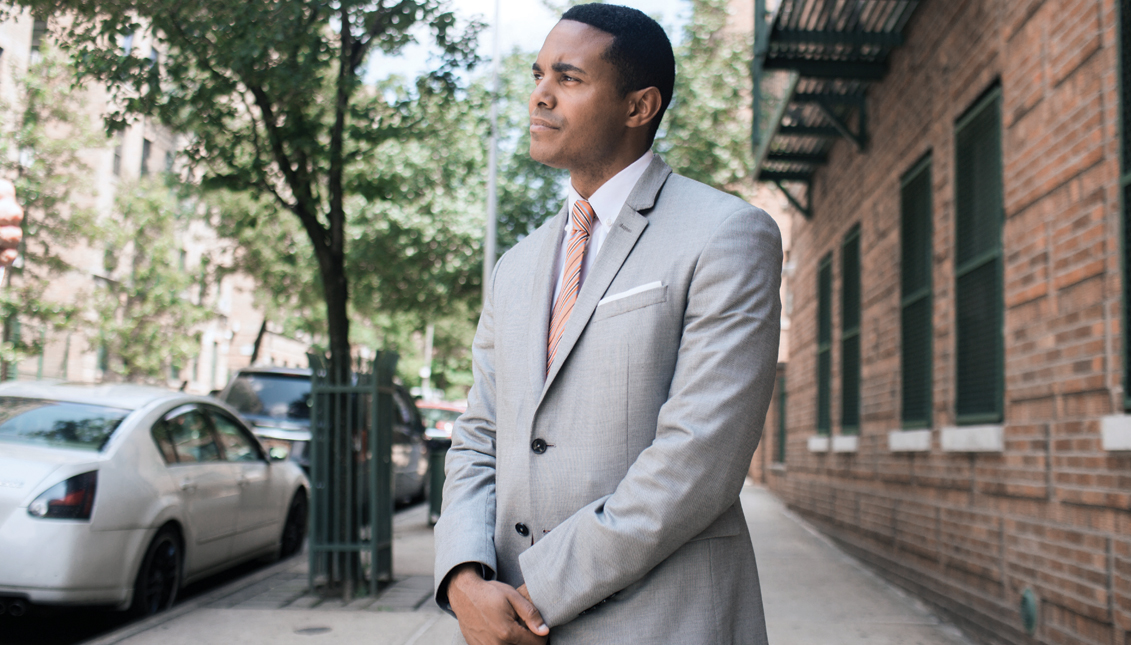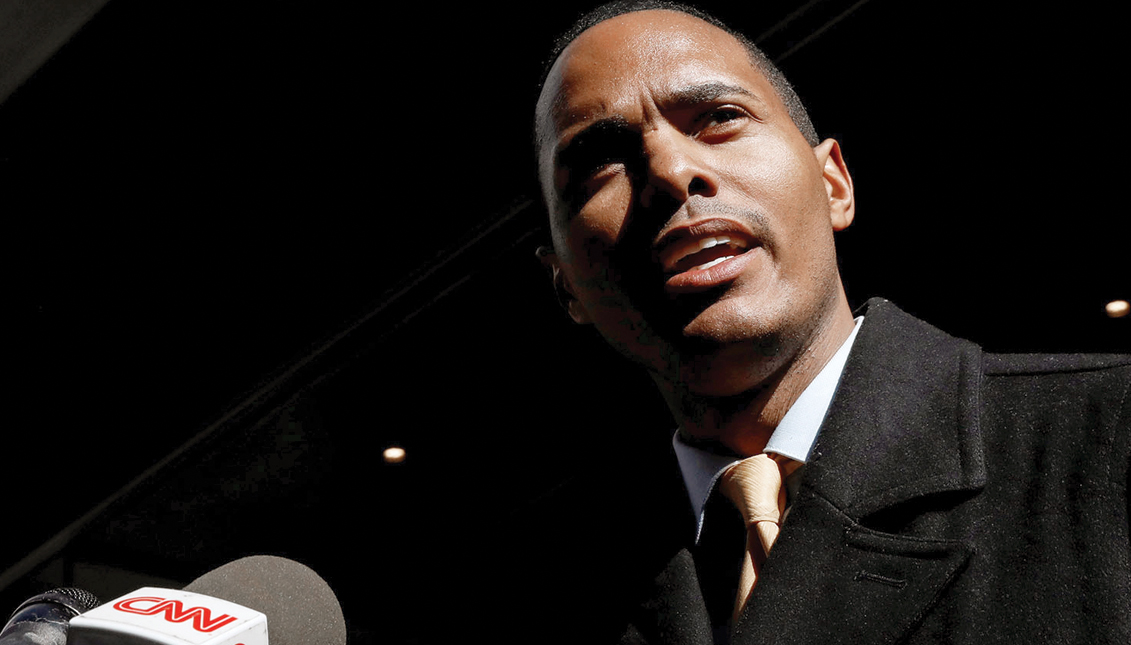
Ritchie Torres' Journey to Become the First LGBTQ+ Afro-Latino in Congress
Ritchie Torres had to overcome tremendous odds to become the Democratic nominee from the South Bronx.
Ritchie Torres, the fighter for the Bronx, is steps away from making history as the first-ever LGBTQ Afro-Latino in Congress, and one of two first-ever Black LGBTQ congressmen.
In an exclusive conversation with AL DÍA, the young political hopeful spoke of his past, his present, and his projects for the future of the country.
While it may appear Torres is on a fast-track to public office, he first had to overcome tremendous odds to get to where he is now. Just 14 years ago, Torres faced the lowest stage of his life.
“I had dropped out of college, I was struggling with depression, I lost my grandmother who was one of the most important people in my life,” Torres said.
“I was struggling with a sexual identity crisis, I felt as if the world around me had collapsed. So there were moments when I even thought of taking my own life. And then seven years later I became the youngest elected official in the largest city in America. And seven years after that, here I am as the Democratic nominee for one of the most iconic congressional districts in America,” he continued.
Born in the Bronx, Torres was raised by a single mother who fought to raise three children on $4.25 minimum wage in the ’90s. His lived experiences are what have shaped his outlook coming into November, where he will face Republican nominee, Orlando Molina, in the nation’s most Democratic district.
He wants to tackle the Affordability Crisis in the Bronx and is grateful for the opportunity to bring visibility to LGBTQ visibility and Afro-Latinos for the first time.

For Torres, the greatest challenge currently confronting the country and his district – communities of color, is the affordability crisis. It has been in place and growing long before COVID-19, which has only exacerbated already established issues.
Torres wants to combat the costs of healthcare, higher education, and especially housing in the South Bronx.
“Whenever you’re debating affordable housing, the question that should come to mind is, ‘affordable for whom?” said Torres.
For him, it is unreal that more than half of residents in his district pay more than half of their income to afford rent before factoring in necessities like food, healthcare, utilities, and transportation.
“And so I’m intent on dramatically expanding the sectioning program, the housing voucher program so that every American in need has a right to safe, decent affordable housing,” he said.
Torres argues the proper standard for affordability is household income, instead of the Area Median Income (AMI), which in New York City according to the federal government is around $50,000-$60,000 a year.
The problem is that figure is more than double the AMI in the South Bronx, which is $25,000.
“So even low-income by the standards of the federal government is unaffordable to most low-income New Yorkers in the South Bronx,” he said.
But the ties run even deeper.
“I grew up in a public housing development right across the street from a Trump golf course, and as I saw the conditions in my home get worse. The city was investing more than $100 million dollars in a golf course for Donald Trump.” Torres said.
“I remember asking myself, what does it say about our society? Our values and priorities as a society? That we’re willing to invest more in a gated, gilded golf course for Donald Trump than we would in the homes of Black and Brown New Yorkers? And so I said to myself – rather than complain about it, and stand by passively on the sidelines, why not become the change I wish to see?” he said.
Torres continued his family’s heritage of advocating for public housing by starting off as a housing organizer, eventually running for office, becoming the first-ever openly LGBTQ New York City Councilmember.
“When I lived in public housing, and as the golf course was undergoing construction, it unleashed an infestation of skunks,” he said. “And so I jokingly tell people I’ve been smelling the stench of Donald Trump well before he became president.”
That situation would further fuel Torres’ political aspirations.
“It was the experience of inequality in the shadow of Donald Trump that inspired me to run for public office,” Torres said. “How the world turns.”
It is these lived experiences that motivated Torres to Run for office, and now he may make history on two fronts: LGBTQ and Afro-Latinx representation.

Ritchie Torres is optimistic that the nation is moving in a progressive direction in terms of LGBTQ representation, and he’s direct proof of this.
He ran in the most fiercely-contested Democratic primary in New York City – twelve candidates, five elected officials, and the front runner was Ruben Diaz Sr.
“Known to be the most anti-LGBTQ elected official in New York City,” said Torres. “He was widely thought to be unbeatable, because he's been a larger-than-life elected official, longer than I’ve been alive.”
“And against all odds, not only did I win, I defeated him by a margin of three to one.”
In fact, Torres defeated Diaz so decisively that his opponent announced his retirement. His triumph, he admits, might not have happened 10 years ago.
Torres figuratively called the South Bronx the “Bible Belt” of New York City. To win here, as he did, is the true sign of change.
“My candidacy is reflective of the changing moments in which we are living,” Torres said. “You know, it’s one thing to have an openly-LGBTQ congressional candidate in the West Village, or in Chelsea, which are gay meccas. It’s something else to have it in the South Bronx.”
Torres and Mondaire Jones, the Democratic candidate for New York’s 17th Congressional district will need to wait until November to see if they will become the first-ever openly gay Black congressmen in history.
RELATED CONTENT
Not even officially part of Congress yet, Torres is already challenging its antiquated rules.
At the start of July, he expressed his dismay at the divisions within the Congressional Caucus system, which unfortunately is reflective of a U.S. culture that is still struggling to embrace dual identities or even multi-identities.
He challenged Congress’ rule that prohibits Afro-Latino members of Congress like him from joining both the Congressional Black Caucus and the Congressional Hispanic Caucus.
This binary system, as opposed to an intersectional acceptance of identity, does not sit right with Torres.
“My candidacy is reflective of the changing moments in which we are living”
By denying him the ability to be visible as both a Hispanic and a Black individual, the Caucus system is deepening the racial divides, when in reality mixed-heritage individuals like Torres cannot see it as one way or the other.
“So under the Caucus rules of the house, you can either be Black or Latino but never both. But in the real world, you can be both. I am both. I am Afro-Latino. I am both Black and Latino and I refuse to choose between the two,” he said.
Torres says he insists on embracing the intersectionality of who he is, and his plea to Congress is that the system must update its antiquated rules in order to reflect the real world outside of its halls – where there is a complexity of multiethnic identities that make up a diverse Democracy.
“I believe that we are living in an Age of Racial Enlightenment. More and more people are conscious of race, are conscious of systemic racism,” Torres said, “and we ought to have caucuses that embrace an enlightened conception of racial identity. I think a rule that insists on a binary is discriminatory against Afro-Latinos like myself.”

When asked about the future of elected officials like him, who represent the next generation of leadership, Torres said that he is proud.
Candace Valenzuela (D-TX), for instance, could become the very first Afro-Latina in Congress if she wins the general election in November for Texas’ District 24.
“Candace and I, in particular, represent a real breakthrough for Afro-Latinx representation within the halls of Congress.”
Torres said he is committed to supporting candidates who reflect the diversity of America.
“I want to see a Congress every bit as diverse as America itself... she [Valenzuela] to me represents the kind of progressive, young leadership that we urgently need in the halls of Congress,” Torres continued.
“I believe that we are living in an Age of Racial Enlightenment. More and more people are conscious of race, are conscious of systemic racism”
“I am committed to supporting candidates in the mold of Candace and myself, but I think I inspire people simply by being who I am.”
Perhaps the main reason Torres won is because voters in his district in the Bronx saw themselves for the first time in a long time. They saw their story and their struggle reflected through him. They saw one of their own.
“That is inspirational to people from the Bronx. I represent the possibility that a young kid of color, from a single mother, from the South Bronx, can rise, and become a leader in the most powerful nation in the world,” he said.
Whether it be the affordability crisis, public housing, or representation on several fronts, Ritchie Torres is their “Fighter for the Bronx,” and to him, it is gratifying to see the immediate acceptance, which he doesn’t take for granted.
“I feel like many people are hearing about Afro-Latinos for the first time,” he said, “and so for me to be in a position to give visibility to Afro-Latino, Afro-Latina, Afro-Latinx identity… is deeply satisfying.











LEAVE A COMMENT: